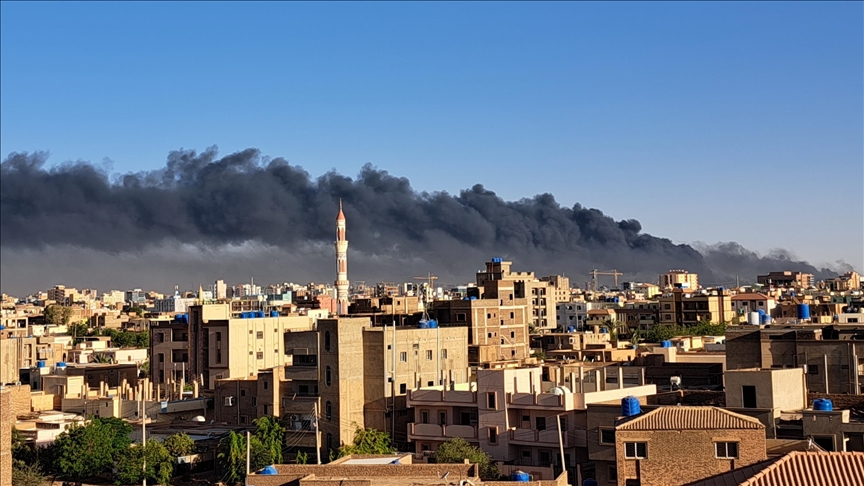

By Anadolu Agency
JOHANNESBURG
The conflict that erupted in Sudan last weekend undermines democratic gains made by the continent as well as the African Union’s agenda of “silencing the guns” in Africa, according to regional analysts.
“The ongoing conflict undermines efforts to ensure that democracy prevails in the region in huge countries such as Sudan, which has previously seen violence and instability and which was now expected to turn to a peaceful era,” Kealeboga Maphunye, a political scientist at the University of South Africa, told Anadolu in an interview Tuesday.
Maphunye said the conflict also undermines the African Union’s long-term goals of peace, stability, and “silencing the guns,” an AU flagship initiative of Agenda 2063, which aspires to end all wars and conflict, prevent genocide, and stop gender-based violence.
“The conflicts in Sudan and other parts of the continent take Africa backwards in terms of democratic gains,” Professor Lesiba Teffo from the University of South Africa told Anadolu.
Teffo said that in the past 10 years, Africa made some democratic gains and one had reason to believe the continent was entering a new sphere where credible elections and good governance were the trend, but conflicts and coups are now reversing these gains.
“The Sudan tragedy is not only taking Africa backwards but causes huge suffering for its people, who are affected socially, economically, and politically. Thousands are displaced and schools are closed, among others,” he noted.
Conflict is highly destructive
Maphunye said he agreed, calling the conflict highly destructive to Africa’s long-term aims and goals to address democratic challenges and the difficulties of many countries, especially in the Sahel region.
For his part, Teffo blamed African leaders who overstay their terms in office and create dynasties as among the reasons that lead to crises in their countries when they are overthrown or when the masses rise against them.
“African leaders who overstay in power such as Uganda’s Yoweri Museveni and Cameroon’s Paul Biya contribute to bringing Africa backwards. When people take up arms, sometimes it’s due to sitting presidents and political parties who think they have a God-given right to lead despite their poor performance,” he said.
Asked if he thinks the African Union can end the conflict in Sudan, which has now claimed At least 185 lives following clashes between the Sudanese Armed Forces and the Rapid Support Forces (RSF) paramilitary group, he said: “The AU is a toothless bulldog. It hasn’t served its people with glory and honor. It’s African leaders in the body who are failing the organization because of the culture of protecting one another.”
He said African leaders protect each other, fearing that one day they may need shelter from a neighbor when they flee from their countries after being toppled.
Teffo said he believes regional blocs are better than the African Union in resolving conflicts, citing the example of the Economic Community of West African States (ECOWAS), which in 2017 successfully intervened in Gambia when President Yahya Jammeh refused to step down.
Sudan’s conflict not above AU’s ability
Maphunye said he believes Sudan’s ongoing conflict is not above the ability of the African Union to address it.
“In my view, the AU has the capability and political will to address such conflicts within the geopolitical space of Africa,” he said, adding that it would undermine the role of the continental body in charge of all matters in Africa to wait for external powers to intervene.
Maphunye said that since the conflict is more complex, it requires more collaborative efforts between the African Union as the leader and the United Arab Emirates and Saudi Arabia among others to help in mediation.
“It’s the role of Africa through the AU to show it can address the conflict without external interference … The region is volatile. For example, South Sudan, Chad, and Ethiopia have all had conflicts.”
He said the African Union should revisit its old idea of creating a permanent standby force that can be able to temporarily stabilize a country that is bound to implode into civil war, chaos, or military instability.
Maphunye said such a force could help the continent address conflicts when they erupt before spiraling out of control
“There is need for a permanent African Union conflict and dispute resolution mechanism … The AU commission should sit down to recraft such a mechanism,” he added.
We use cookies on our website to give you a better experience, improve performance, and for analytics. For more information, please see our Cookie Policy By clicking “Accept” you agree to our use of cookies.
Read More